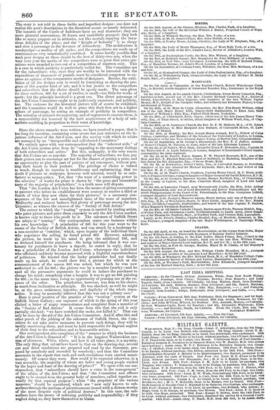Since the above remarks were written, we have received a
paper, that is too long for insertion, containing some severe but just strictures on the in- jurious influence of the Art-Union, and the secrecy with which its affairs are managed by an "irresponsible and self-elected Committee."
We entirely agree with our correspondent that the "inherent evils" of the Art-Union system arise from its "appealing to the mercenary feelings of both subscribers and artists." But this, unhappily, is the very reason that Art-Unions are so popular. The majority of subscribers, we fear, pay their guinea not to encourage art but for the chance of getting a prize, and an opportunity to play the part of patrons of art extempore, without put- ting their hands in their pockets. The privilege of choice is valued so much, though its exercise is troublesome and embarrassing, that we doubt if pictures or sculpture, however well selected, would be so satis- factory as money-prizes. Yet, that "the want of a controlling power in the selection" of works for prizes is shown by "the gross and lamentable taste of the majority of prizeholders," is a truth none will dispute.
That "the London Art-Union has been the means of giving consequence to painters who before its establishment were content to receive a third or fourth of what they now claim for their pictures," is a necessary con- sequence of the low and unenlightened taste of the mass of members. Mediocrity and eminent badness find plenty of patronage among the Art- "Unionists; as witness the success of the "Society of Bad Artists."
The extent to which the "touting" system is carried by trading artists, who paint pictures and price them expressly to suit the Art-Union market, is known only to those who profit by it. The salesmen of Suffolk Street are adepts in "touting." Our correspondent states one instance within his own knowledge. "A prizeholder of 50/. for this year went to the rooms of the Society of British Artists, and was struck by a landscape by a non-member or outsider,' which, upon inquiry of the individual there who negotiates the selling, he found priced 601. However, admiring the picture, he made up his mind to give the additional 101., and so declared himself the purchaser. On being informed that it was cus- tomary for purchasers to leave a deposit, he stated in reply, that he was a prizeholder of the London Art-Union; whereupon the individual who officiated suddenly became possessed with a frightful superabundance of politeness. He trusted that the lucky prizeholder had not finally made up his mind; he could show him a picture for which at the commencement of the season 80/. was asked, but which he was now
authorized to sell for 601.: the picture was by a member (mark)—and he
used all the persuasive arguments he could to induce the purchaser to change his mind; remarking what a bargain it was to get an 80/. painting for 601.; in the mean time, losing no opportunity of praising one at the ex- pense of the other. The prizeholder, however, was firm to his choice, as much from inclination as principle. He was shocked, as well he might be, at the gross unfairness, injustice, and duplicity of the whole trans- action. It may be assuredly inferred that this was not a solitary case."
Here is proof positive of the practice of the " touting " system at the Suffolk Street Gallery; our exposure of which in the spring of this year elicited a letter of angry remonstrance and complaint from a member of the "Society of Bad Artists." It seems from this that the evil is only partially checked: "we have scotched the snake, not killed it." That can only be done by the aid of the Art-Union Committee. And if, after this and other proofs of the jobbing of the salesmen of Suffolk Street, the Com- mittee do not take active measures to prevent such doings, they will be tacitly sanctioning them, and must be held responsible for flagrant neglect of their duty to the subscribers and to honourable artists.
Our correspondent also complains of the " manner in which the business of the Art-Union is disposed of." "It is in the happiest Walbrookian sys- tem of closeness. When, where, and how it all takes place, is a mystery. The only thing that subscribers know is, that on the drawing-day, several cut and dried resolutions are prepared and read by the Secretary, pro- posed by somebody and seconded by somebody; and then the Committee announce in the report that such and such resolutions were carried unani- mously. Of course they were. How could it be expected otherwise, in a vast assembly, the majority of whom are ladies and young people excited by the hopes and fears of the drawing of prizes?" We agree with our cor- respondent, that "subscribers should have a voice in the management" of the affairs of the Art-Union; and that "the Committee and officers ought to be elected from the general body of members, called together an- nually for that especial purpose"; when "the propriety of the various
measures" should be considered, which are "now only known to sub- scribers through the medium of advertisements issued with a dictum worthy of the most despotic style of political decrees." In this case, the sub- scribers have the means of enforcing publicity and responsibility: if they neglect doing so, they have themselves to blame.


























 Previous page
Previous page